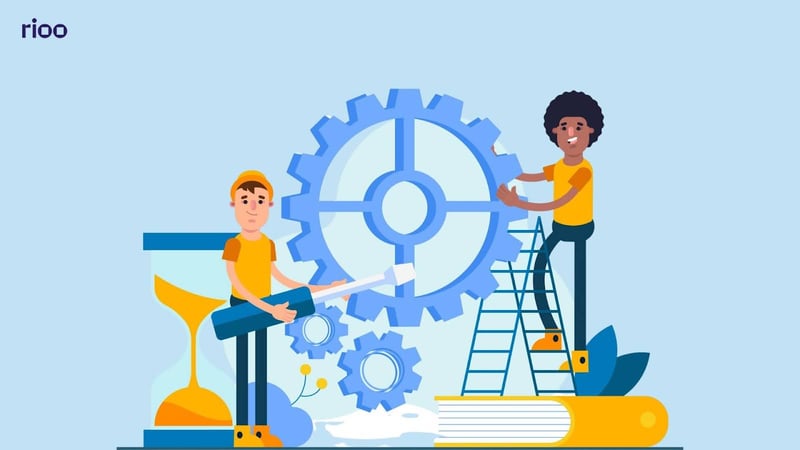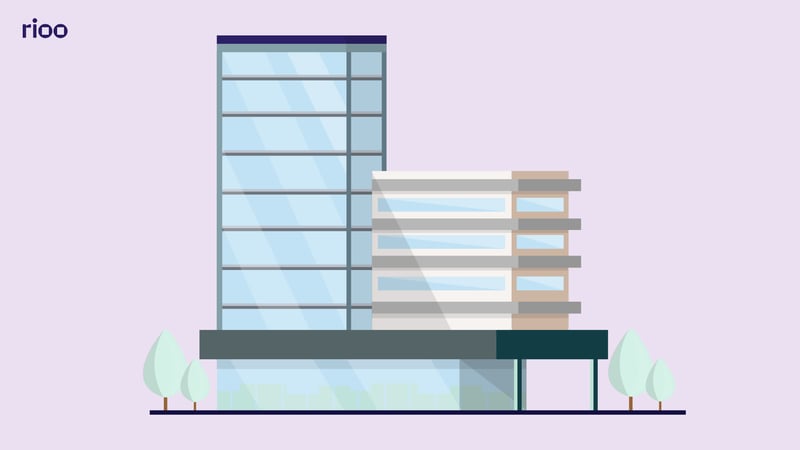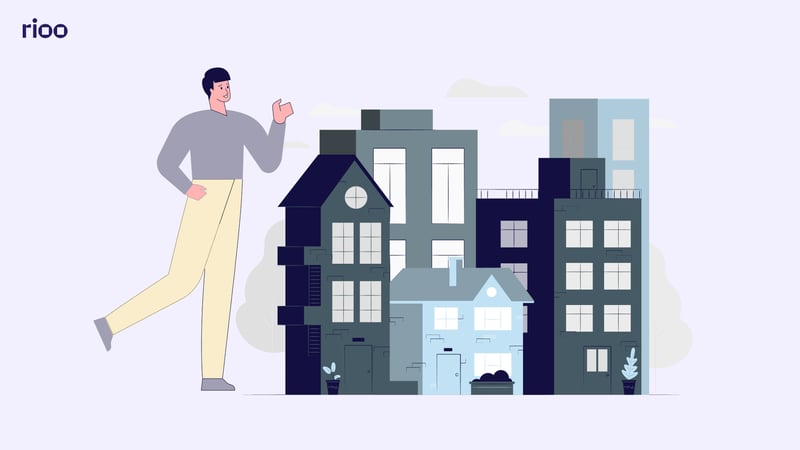Facility maintenance management means keeping your entire property ecosystem running smoothly day after day, without surprises. Electrical systems to elevators, water leaks, and weekly cleaning determine your buildings' safety, functionality, and livability.
Whether you're managing multifamily apartments, offices, or mixed-use spaces, good maintenance is expected. Residents notice everything. And when something breaks, your response defines your brand more than your brochure ever will.
When done right, it prevents emergencies, controls costs, keeps residents happy, and increases asset lifespan. When ignored or handled poorly, it creates delays, inflates budgets, erodes trust, and eventually hits your bottom line.
This guide walks you through what facility maintenance management means, why it matters, what challenges property managers face, and how tools like RIOO can make your team better equipped to prevent chaos before it starts.
Quick Summary
- Keeping your properties safe, functional, and comfortable means staying on top of all maintenance tasks before they become problems.
- A good maintenance plan combines regular checkups, addressing issues as they arise, and utilizing data to identify problems before they occur.
- Apartments, offices, and mixed-use buildings each have different maintenance needs, so you need the right tools to handle them all smoothly.
- The best maintenance systems enable you to track requests in one place, remind you about scheduled tasks, keep residents informed, and manage vendors efficiently.
- Tools like RIOO bring all these features together, helping property managers save time, cut costs, and keep residents happy without the usual headaches.
What is Facility Maintenance Management?
Facility maintenance management is the systematic process of organising, planning, tracking, and optimizing all activities related to maintaining a property's physical assets.
This includes:
- Plumbing, electrical, and HVAC systems.
- Elevators, lighting, and fire safety equipment.
- Exterior and interior upkeep.
- Grounds maintenance.
- Vendor coordination and scheduling.
- Cleaning and janitorial services.
- Compliance checks and safety protocols.
- Resident request tracking and ticket resolution.
At its core, it’s about being proactive, not reactive. You want systems in place that catch issues early or, better yet, prevent them altogether. This gives you complete visibility into what’s happening across your properties.
Why it Matters More Than You Think
Most of the time, residents and tenants don’t think about maintenance until something goes wrong. And when it does, they expect quick, professional responses.
That’s why efficient facility management isn’t just operational; it’s strategic.
Direct Benefits:
- Fewer complaints.
- Lower repair costs.
- Better resident retention.
- Longer equipment life.
- Stronger compliance scores.
- Higher property values.
Indirect Benefits:
- Your staff works smarter, not harder.
- Your vendors perform more predictably.
- Your leadership gets precise data for better decisions.
In a market where operating margins are tighter and expectations are higher, facility maintenance becomes a competitive advantage.
The Three Core Types of Facility Maintenance
To run efficient buildings, you’ll need a balance of these three strategies:
1. Preventive Maintenance (PM)
This is scheduled upkeep that prevents breakdowns before they occur. Think of it like getting an oil change before your engine seizes.
Examples:
- HVAC filter changes every 90 days.
- Elevator inspections are conducted every 6 months.
- Roof drainage checks should be done before the rainy season.
Why it matters: It’s cheaper to maintain than to fix. Preventive maintenance also reduces downtime and tenant disruptions.
2. Reactive (Corrective) Maintenance
These are unscheduled, on-demand fixes. A leak, a broken light switch, or a jammed door. This is where most managers spend too much time chasing problems instead of staying ahead of them.
Why it matters: You can’t avoid every issue, but you can reduce them with good planning and response systems.
3. Predictive Maintenance
Predictive Maintenance uses data and analytics to forecast issues before they happen. Consider HVAC systems equipped with IoT sensors that alert you when they’re trending toward failure.
Why it matters: It’s ideal for high-end portfolios or mission-critical equipment. It costs more upfront but delivers long-term savings.
Facility Maintenance for Different Property Types
Facility maintenance looks different depending on the type of property you manage. Every property type, apartments, offices, or mixed-use spaces, faces unique challenges, including resident needs, business demands, and complex maintenance requirements.
- High ticket volume.
- Emergency requests (plumbing, HVAC).
- High focus on resident satisfaction.
- More emphasis on compliance and long-term asset care.
- Equipment-heavy (elevators, HVAC zones, power systems).
- Mixed-Use Properties
-
-
- A blend of public and private space.
- Dual stakeholders (residents and business tenants).
-
Handling varied property needs doesn’t have to be overwhelming. With RIOO, you can centralize requests, automate tasks, and keep vendors aligned. Stay in control and deliver a better experience across every property type.
What a Strong Facility Maintenance System Looks Like
If you’re still relying on spreadsheets or email threads to manage 50+ units, things will fall through the cracks. A sound system has structure, automation, and transparency baked in.
Here’s what best-in-class facility maintenance management includes:
1. Centralized Work Order Tracking
Every maintenance request should:
- Be logged in one place.
- Show timestamps and technician notes.
- Include photos or videos from the resident.
- Be tracked by urgency and completion time.
2. Preventive Maintenance Scheduling
Recurring tasks should never require manual reminders. Your system should automatically notify the right people when:
- Elevator inspections are due.
- Fire alarms need testing.
- HVAC filters need changing.
3. Real-Time Resident Communication
Maintenance delays create silence. And silence creates frustration.
A modern system should:
- Let residents submit requests easily (via mobile or portal).
- Auto-confirm receipt of the request.
- Provide real-time updates on ticket progress.
4. Vendor and Technician Management
If you use external vendors, you need:
- SLA tracking (Service Level Agreements).
- Job history and reviews.
- Invoice and payment links.
5. Budget and Cost Controls
You should be able to answer:
- What are your top maintenance cost drivers?.
- Which buildings cost more to maintain?.
- How has repair spending changed over time?.
Also Read: Reducing Downtime: Why Efficient Task Handling Matters in Facility Maintenance
Top Challenges Property Teams Face
Even the best teams struggle with maintenance, especially at scale. Here’s what you’re up against:
- Too Many Systems: You use one tool for maintenance tickets. Another for resident communication. A third for vendor payments. Add spreadsheets for scheduling and Google Drive for records. It’s chaos.
- No Visibility Across Portfolios: If you manage dozens of buildings, knowing which one is falling behind is half the battle. Without cross-property visibility, you’re always in catch-up mode.
- Poor Resident Experience: Delayed updates. No repair status. Unclear timelines. These problems lead to bad reviews, increased churn, and loss of trust.
- Compliance Overlaps: Missing mandatory inspections or letting certifications lapse can result in fines or, worse, lawsuits.
For more insights on tackling common facility management hurdles, explore Common Challenges in Facility Management and How to Solve Them with Better Tools.
How RIOO Simplifies Facility Maintenance
RIOO is a powerful yet user-friendly platform that simplifies and streamlines facility maintenance across all types of properties, helping managers stay proactive and efficient.
What RIOO offers you:
- Centralized Work Order Management: Keep all maintenance requests organized in one place, ensuring that nothing slips through the cracks and repairs are handled promptly.
- Automated Preventive Maintenance: Easily schedule regular upkeep like HVAC servicing or elevator checks, reducing emergency fixes and extending asset life.
- Transparent Resident Communication: Residents can submit requests effortlessly and receive real-time updates, improving satisfaction and trust.
- Efficient Vendor and Technician Coordination: Assign tasks, track performance, and monitor service agreements all in one dashboard.
- Insightful Analytics: Access real-time data on repair times, costs, and outstanding work to make smarter maintenance decisions.
- Role-Based Access and Portfolio Oversight: Manage multiple properties while giving relevant access to owners, managers, tenants, and vendors.
In short, RIOO simplifies facility maintenance management, providing you with complete visibility, enhanced control, and smoother operations.
Ready to simplify facility maintenance? Get started with RIOO and see immediate results.
Final Thoughts
Effective facility maintenance management is crucial for ensuring safe, functional, and aesthetically pleasing properties that meet the expectations of both residents and tenants.
By adopting a proactive approach that balances preventive, reactive, and predictive maintenance strategies, property managers can reduce costs, avoid emergencies, and extend the life of critical assets.
However, managing maintenance tasks across diverse property types and multiple vendors can quickly become complex and overwhelming without the right tools. That’s where a modern, integrated platform like RIOO makes all the difference.
RIOO gives you the tools to do precisely that. From work order tracking to preventive scheduling and vendor oversight, it’s built to help property managers take control without adding complexity.
Experience the future of property maintenance management. Try RIOO and transform your workflow now!
FAQs
- What does facility maintenance management include?
It includes tracking, scheduling, and completing maintenance tasks such as HVAC servicing, plumbing, cleaning, safety checks, and structural repairs. - Why is preventive maintenance essential in property management?
Preventive maintenance reduces equipment failure, avoids resident complaints, and lowers long-term repair costs by catching issues early. - How can I improve my maintenance workflow?
Use a unified platform like RIOO to centralize work orders, automate tasks, communicate in real time, and track performance across properties. - How does RIOO help with facility maintenance?
RIOO offers real-time work order tracking, preventive maintenance scheduling, vendor management, resident communication, and integrated analytics in one place. -
What KPIs should I track for facility maintenance?
You should monitor the average time to resolve requests, the ratio of preventive to reactive actions, satisfaction scores, and per-task cost breakdowns.















